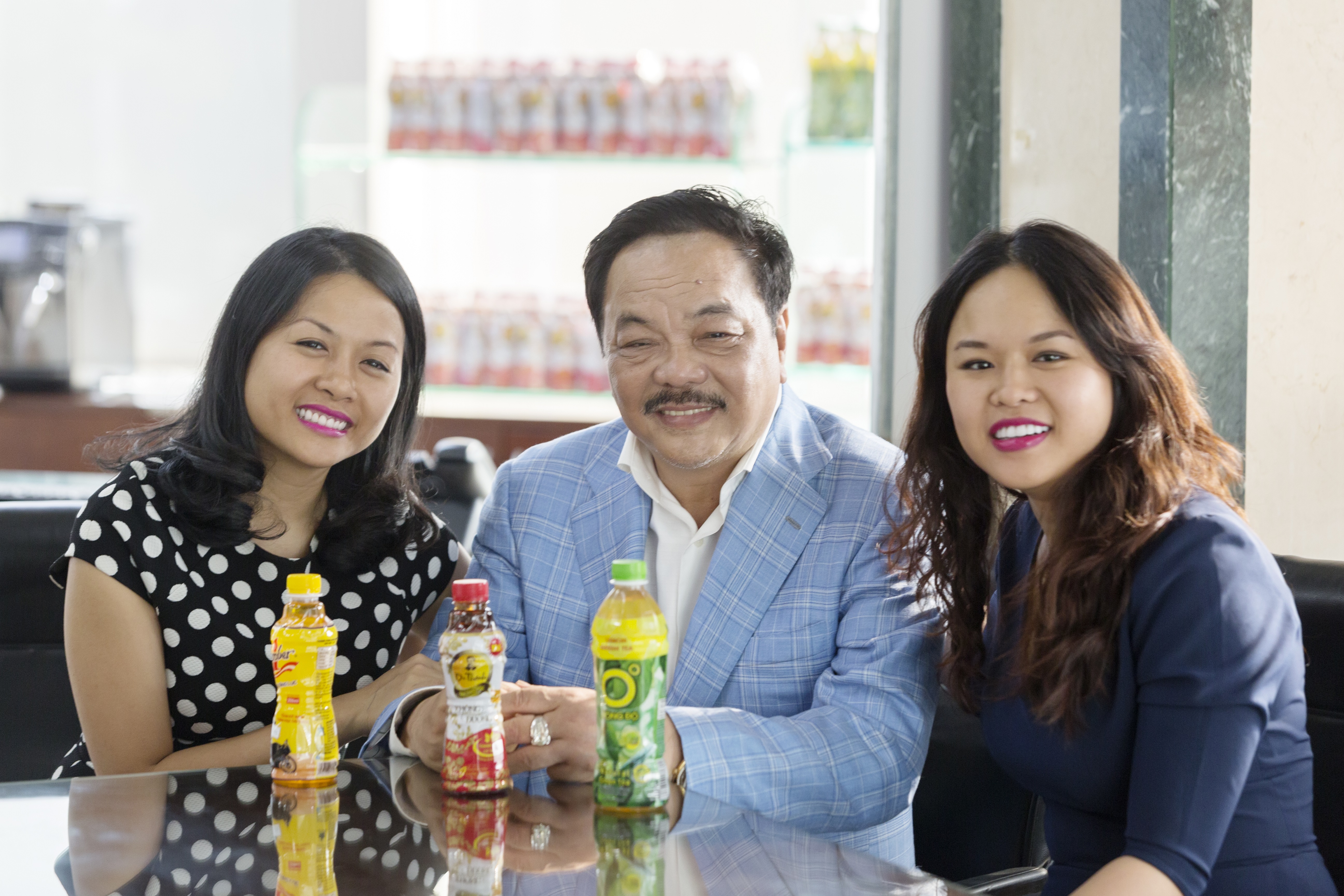Tan Hiep Phat’s great aspiration to become a billion-dollar Vietnamese enterprise
 |
| “Great success comes only when boat sets sail towards the open sea. No success will come of anchoring on a river. On the open sea, there is no guarantee against a severe storm. The challenge lies in navigating the boat through the hazards of thunderstorms.” - Uyen Phuong |
The prime minister has recently issued Decree No.71/2017/ND-CP on new corporate governance rules for public join stock companies in Vietnam, specifically stipulating the fact that there must be independent members participating in the board of directors of these companies. As a billion-dollar private enterprise, will Tan Hiep Phat ever wish to attract more investors to become a public company and adopt a new management model?
In 1992, the presence of private enterprises helped the business sector prosper. In 1994, the centrally-planned economy was opened to a considerable degree for the establishment of private enterprises. In 1995, the United States lifted the embargo after 20 years, allowing Vietnam to open up trade with international partners. Entrepreneurs were confident in reinvesting their profits into long-term projects. This was also the time Tan Hiep Phat was officially born.
Tan Hiep Phat aims to contribute to the prosperity of society through the production of the country’s leading beverage brands. Our goal is to become one of the leading Asian corporations in the food and beverage industry.
In order to realise this goal by improving corporate governance, we have adopted numerous management practices in accordance with international standards.
For example, we have been leading the application of the advanced ERP management system, innovative reporting and internal control systems, the ISO 9001:2000 quality management system, the ISO 14001:2004 and HACCP environmental management systems developed by international agency DET NORKE VERITAS (the Netherlands), as well as the HACCP management for food hygiene and safety standards—just to name a few items on a very long list—along with raising employees’ ownership in the group.
As such, having an actual stake in the company is the perfect way to build a responsible and dynamic corporate culture.
 |
| "Our goal is to become one of the leading Asian corporations in the food and beverage industry" - Uyen Phuong |
At present, Tan Hiep Phat is still a family company in general, with the participation of independent members in the board of directors who are in charge of independent financial supervision as well as other activities. Anyone who loves Tan Hiep Phat and wishes to join us to realise our goal of becoming one of the leading companies in Southeast Asia is welcome.
I have always wished to build a great team to support our vision. It is difficult for someone to change the world on their own, but with the proper team for company, nothing is impossible. An excellent team can definitely help overcome any challenge.
Having studied at some of the world’s most prestigious schools for corporate governance, then returning to Vietnam and joining the management of Tan Hiep Phat, can you talk about your work on applying modern governance principles in the Vietnamese environment?
An issue all businesses face is that they need long-term management to achieve their ultimate goals, but must frequently adopt short-term management practices. Therefore, applying governance principles to harmonise short-term and long-term goals is a challenge for any corporate executive.
The application of modern governance principles to a business operating in Vietnam has been experiencing certain difficulties. This may stem from the limitations on the internal capabilities of the enterprise itself or negative external factors caused by an incomplete regulatory framework or the existence of disadvantageous business conditions that inevitably impede or create an unfavourable environment for business development.
In your recently released book, The Story of Dr. Thanh’s Family, you gave a detailed account of the company’s triple crisis in 2014, when a financial crisis, a product boycott, and Dr. Thanh’s poor health pushed Tan Hiep Phat to its limits. If you could return in time, what would you do differently?
Everyone can fail, but there are lessons in every failure. The question is whether we have learnt anything from this failure. Great success usually comes with high risk, that is how the founder of Tan Hiep Phat—my father, Tran Qui Thanh—explained everything. Great success comes only when boat sets sail towards the open sea. No success will come of anchoring on a river. On the open sea, there is no guarantee against a severe storm. The challenge lies in navigating the boat through the hazards of thunderstorms.
In 2014, the Tan Hiep Phat family went through very hard times. It was also a year for me to experience and grow a lot. You can try reading the book to learn about the incidents and try on the pressure on our shoulders back then.
 |
| Dr Thanh with his two daughters |
What helped us overcome the crisis was tremendous and unyielding effort every day and every hour to consistently realise the group’s mission: providing customers with healthy products at international-standard quality. We have boldly publicised transparent information and opened our factories to the public so that each customer can be a judge and evaluator.
Particularly, besides sticking to our long-established core values, the unity of all people at Tan Hiep Phat, not only family members but also employees and partners, has given us the confidence and the strength to calmly face and address each issue, and ultimately overcome the storm and step forward.
Seeing as you arrived with sizeable knowledge learnt from school and hefty entrepreneurial experience learnt from Dr Thanh himself, which one did you find more useful in helping Tan Hiep Phat flourish?
By putting more factories in operation, such as the Number 1 Factory in Ha Nam and the Number 1 Factory in Chu Lai, we expect to cover the market demand.
We will step on to a larger playing field rather than only aiming at Asian markets, and we are trying to become a $3-billion enterprise by 2030.
The Vietnamese market has great potential and we strongly believe that we can do it. We want to reinforce our position as a billion-dollar enterprise over the next five years.
 |
| A factory of Tan Hiep Phat Group |
Reality is the best school. School is the best place to train your analytical abilities, but real-life practice, performance, and the achievement of goals depend on a number of other factors, of which attitude is the most important. I have learnt from my father’s views on life and everyday difficulties. His way of perceiving things always showed me new directions and pushed the organisation to new heights.
Actually, my father gave me a choice between “inheritance” and “succession,” but I straightout refused “inheritance.” In the family, we understand that inheritance is a responsibility and an obligation, not a right.
My father put out a request that after his retirement all assets and profit of Tan Hiep Phat be transferred to his successors, the next generation of the family. I believe we can and will do our best. I want to highlight that the highest positions at Tan Hiep Phat are not occupied by family members only, we are always looking for other candidates around the world to achieve our goals.
Being an emotional and knowledgeable woman, how do you see success as a businesswoman? Where is the balance between work and family life, according to you?
To me, true success is to create positive values for the people around me.
My father and I are constantly argueing about the balance between work and personal life. The concepts of concentration and balance are polar opposites. It is also a given that if we want to reach the pinnacle or the end of anything, we must stay focused. This rings true for life too.
I have not heard about a single great man who managed to be successful both in their career and family life, even Steve Jobs or Albert Einstein. Most of them would spend all their time on one thing and do the best they can. But this is an argument between me and my father, I am sure everyone will have different views.
What the stars mean:
★ Poor ★ ★ Promising ★★★ Good ★★★★ Very good ★★★★★ Exceptional
Latest News
More News
- Vietnamese enterprises embrace value creation model (December 13, 2024 | 09:00)
- Happy Vietnam awards honour photo and video artists (December 13, 2024 | 08:54)
- Vietnam unveils 2024 rankings of top employers and value-driven enterprises (December 12, 2024 | 17:00)
- ‘Blockbuster’ Eaton Park sells out just one week after launch (December 12, 2024 | 08:00)
- German businesses remain upbeat about Vietnam (December 11, 2024 | 15:45)
- Tech giants bet big on Vietnam's future (December 10, 2024 | 17:53)
- Forum on green solutions for industrial parks and investment promotion organised in Vinh Phuc (December 09, 2024 | 19:08)
- Vietnam and GGGI launch plan for green growth and climate action (December 08, 2024 | 20:38)
- FTZs to open regional doors for logistics (December 07, 2024 | 10:00)
- Vietnam sees increase in FDI in the first 11 months of 2024 (December 06, 2024 | 19:15)


















 Mobile Version
Mobile Version